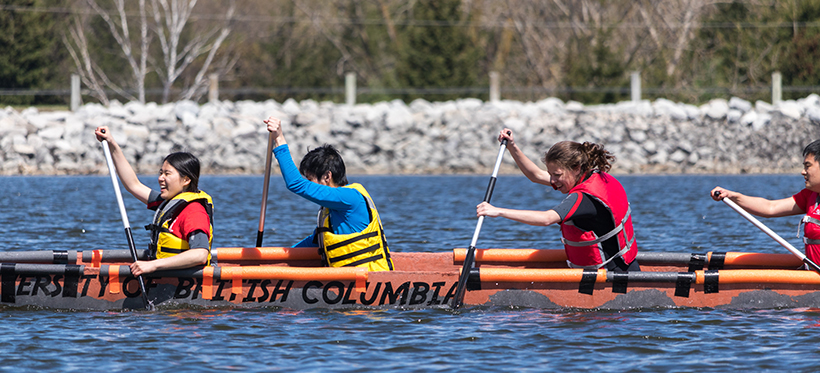
UBC’s Concrete Canoe team recently competed at the Canadian National Concrete Canoe Competition (CNCCC) at Waterloo University in Ontario. This three-day event brought together civil engineering students from all over the country from May 10th – 12th. The UBC team has been preparing for the better part of the year, designing and testing their material, designing their hull, constructing their canoe, and practicing their paddling to go up against the best of their peers Canada-wide. With the cheeky tagline “yes, it floats,” UBC concrete canoe was up to the test.
Preparing for Competition
Concrete Canoe competitions require a huge amount of preparation. The team started trial casting in the fall, experimenting with mix methods to develop a light but durable concrete well before they needed a final product for spring competitions. Besides the material development, they worked on their hull shape, using physics to ensure stable and fast floatation for four occupants. The team’s theme this year was “Volcanoe,”and they added the innovation of making two different colours of concrete, poured to resemble lava flowing down the boat. The team held race practices at the Jericho Sailing Centre to make sure their team was up to the athletic as well as technical challenges. Finally, their canoe, paddles and presentation materials were packed in a 1000 lb. crate and transported across the country via rail, while the 13 competing members flew out to meet it in Waterloo.
The Events in Waterloo
During the three day competition at CNCCC, four elements make up the teams’ final score: a design paper, an oral presentation, the workmanship of their canoe, and of course, the races.
Day one was product display: teams showed off their canoe at a booth prepared to showcase its design highlights. The second day featured a five minute oral presentation in front of a 120 person audience, after which they had to answer judges’ questions about their design paper. These two days allowed the judges to assess each team’s academic performance, workmanship, and ensure competition rules were followed – deducting points if they were not. With concrete being a difficult medium to work with, this is where the UBC Concrete Canoe’s months of material design, trial casting and their use of two colours came into play. Their hard work paid off, resulting in an extremely stable hull which more than doubled the minimum required capacity of four people, carrying up to 11 passengers.
The third day was race day. Paddlers competed in five races: in teams of two for women’s and men’s endurance and sprint, and then in a final four person co-ed sprint. While the scores were down to teams’ final times, other aspects of the canoes’ performance were also reviewed: they still had to float when filled with water and were inspected for damage.
The category scores UBC Concrete Canoe received this year were:
- Design Paper: 4th Place
- Final Product: 7th Place
- Oral Presentation: 8th Place
- 7th Place Overall
The podium was dominated by Quebec teams, with École de technologie supérieure, Polytechnique Montréal and Université de Sherbrooke taking the top three places respectively. UBC’s 7th place result was solidly in the middle of the pack, beating out Waterloo, McGill, Western, Université de Moncton, Queens, Ryerson, Dalhousie, St. Clair and Université d’Ottawa.
UBC Assistant Captain, Ellen Chen described the CNCCC community as very supportive, with teams cheering for both their own members and others, citing the intense nature of the preparation as a bonding experience. There were joint socials and meals, such as an icebreaker party and award banquet, where competitors from different schools mingle and got to know each other, growing their civil engineering network across the country.
How to Join
While largely oriented towards civil engineering, the team is open to all students at UBC, and members also come from geological engineering, materials engineering, and chemical engineering. This year’s team was the largest yet, with over 40 members working on design, testing, and construction. Chen expressed how it’s a great place for first-year engineering students looking for a specialty to get to know civil engineering. At Concrete Canoe, they can get exposure to the hands-on lab work and design software featured in later studies, as well as the depth of experience not always available in a single term class. Now graduating, Chen described her experience joining right at the beginning of her time in civil engineering:
It’s definitely been a highlight for me in my undergrad. I’ve been a part of the team since second year, and the learning from people who have mentored me as well as working with these younger students now, I’ve enjoyed every moment of it.
Students who want to get involved in next year’s competition should visit the UBC Concrete Canoe website, yesitfloats.com, check them out on Facebook or email ubcconcretecanoe@gmail.com.
